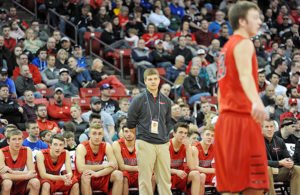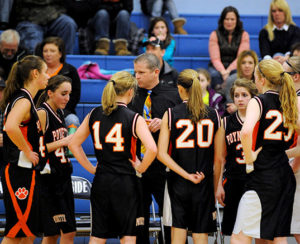Advice for first-time head basketball coaches
Taking the reins of a program can be an exciting step for first-time head coaches. It’s finally time to place their mark on a team and see where it leads them.
But it also can be stressful for anyone who may have unanswered questions about program management, schemes or personnel.
 This summer, we asked experienced head basketball coaches their advice for those who are assuming the position for the first time. Here is what they said.
This summer, we asked experienced head basketball coaches their advice for those who are assuming the position for the first time. Here is what they said.
22 tips for first-time head coaches
1. Set a thorough preseason parent meeting to eliminate any surprises, and always enforce the core values of your program without bending them. Build the foundation of a successful program, and the Xs and Os will take care of themselves.
2. Work with the junior high or middle school coaches and let them know what you expect those players to do when they reach your level.
3. Be sure specific player roles are communicated to both the player and the parent. Have players sign their “role sheet.” This eliminates any confusion on what’s expected during the season.
4. Be fair to everyone, and make all players feel a part of the team regardless of whether they’re the best or worst. Make sure teammates understand that everyone is equal in the eyes of the coach.
5. Don’t be afraid to ask for help or admit that you don’t know something. Nobody has all the answers.
6. Organize and distribute coaches’ responsibilities. Everyone on your staff must understand what’s expected of them.
7. Make time to build positive relationships with your staff, athletes, parents and the community. The better you communicate your vision, the better it will be received.
8. Be yourself. Don’t marry a system, but have certain demands of your players and coaches, regardless of how you’re going to play.
9. Have fun, and make sure all the players are having fun. We sometimes get way too caught up in our competitive spirits.
10. Don’t allow the parents to run you off. Stand strong in that what you’re doing is right for the kids. Here is some help.
11. Listen and learn from other mentors you had as coaches. Make sure you communicate with your administrators, and develop trusting relationships with your players.
12. Plan, plan and plan some more. Preparation is the best advice anyone can use. Whether it’s practice planning or game planning, it helps you immensely. Here is some help for practices.
13. Once you have chosen a style of play that fits your team’s talent, seek out programs that have successfully run that style for advice.
14. Less is more, and always be prepared for the last five minutes of the game.
15. Collect as much information as you can from great coaches, and use that to mold your own personal coaching philosophy.

16. Understand that you don’t have all the answers. The first year will likely be an adjustment period for you and your team. Try to keep it as simple as possible, and allow the team to master a few things versus being OK at a lot of things.
17. Be ready to work. The head coaching position can involve long hours and more time away from your family. Understand what you’re sacrificing.
18. Avoid deciding upon an offensive/defensive system until you get to know the strengths and weaknesses of your players. Too many young coaches enter their positions having already determined a style of play, and those premonitions might not fit the skill sets of their players. Here is some help for defense.
19. Find the three to five most successful coaches in the area and reach out to them regarding their priorities for success.
20. Communicate with your bosses as often as possible. Let them in on your plans for the program, and get out ahead of potential problems. Communicate with other coaches, especially the football coach. Stress conditioning, fundamentals and team play.
21. Talk to each kid in the program and make them feel wanted. In the end, players want to know three things from their coach — Can I trust you? Can you make me better? Do you care about me? These are the things that can really help a coach in a new job.
22. Understand the influence that you have on your athletes. Act appropriately, teach pride instead of arrogance, and be humble. Teach them to love the game, not just the wins.









